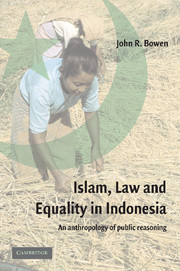Book contents
- Frontmatter
- Contents
- List of illustrations
- List of tables
- Acknowledgments
- Glossary
- Part 1 Village repertoires
- Part 2 Reasoning legally through scripture
- 4 The contours of the courts
- 5 The judicial history of “consensus”
- 6 The poisoned gift
- 7 Historicizing scripture, justifying equality
- Part 3 Governing Muslims through family
- References
- Index
5 - The judicial history of “consensus”
Published online by Cambridge University Press: 07 January 2010
- Frontmatter
- Contents
- List of illustrations
- List of tables
- Acknowledgments
- Glossary
- Part 1 Village repertoires
- Part 2 Reasoning legally through scripture
- 4 The contours of the courts
- 5 The judicial history of “consensus”
- 6 The poisoned gift
- 7 Historicizing scripture, justifying equality
- Part 3 Governing Muslims through family
- References
- Index
Summary
In this and the following chapter, I consider the history of decision-making in the two Takèngën courts. I draw on case dossiers, interviews with judges, and field research into the social history of the region. In this chapter, I focus on how judges weigh and evaluate claims that a social consensus has been reached vis-à-vis claims that one has overriding rights under Islamic inheritance law. The case shows the multiple ways in which judges can translate cultural ideas of fairness and agreement into publicly arguable rules of law. Because little change has occurred in the basic normative frameworks to which the judges refer, the study allows us to highlight the relationships between these legal changes and concomitant social changes. A microhistorical study of this sort has the methodological advantage of greater control over other elements than does a comparative study of courts.
Judges on both Takèngën courts have shifted their approach to family property disputes. From independence through the 1960s, judges usually upheld Gayo adat norms in disputes about the proper distribution of family property. Local norms were at first assumed, later explicitly claimed, to provide sufficient legal grounds for dividing wealth. Beginning around 1970, however, the courts began to rule against these older divisions. Both courts now held that the only acceptable basis for dividing family property was Islamic law, either because those norms had become part of Gayo adat, or because, whatever adat might say, Islamic norms took priority in such matters.
- Type
- Chapter
- Information
- Islam, Law, and Equality in IndonesiaAn Anthropology of Public Reasoning, pp. 89 - 122Publisher: Cambridge University PressPrint publication year: 2003



